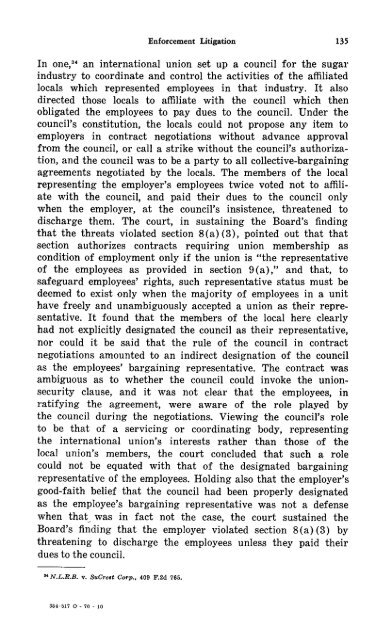1 - National Labor Relations Board
1 - National Labor Relations Board
1 - National Labor Relations Board
Create successful ePaper yourself
Turn your PDF publications into a flip-book with our unique Google optimized e-Paper software.
Enforcement Litigation 135<br />
In one, 34 an international union set up a council for the sugar<br />
industry to coordinate and control the activities of the affiliated<br />
locals which represented employees in that industry. It also<br />
directed those locals to affiliate with the council which then<br />
obligated the employees to pay dues to the council. Under the<br />
council's constitution, the locals could not propose any item to<br />
employers in contract negotiations without advance approval<br />
from the council, or call a strike without the council's authorization,<br />
and the council was to be a party to all collective-bargaining<br />
agreements negotiated by the locals. The members of the local<br />
representing the employer's employees twice voted not to affiliate<br />
with the council, and paid their dues to the council only<br />
when the employer, at the council's insistence, threatened to<br />
discharge them. The court, in sustaining the <strong>Board</strong>'s finding<br />
that the threats violated section 8(a) (3), pointed out that that<br />
section authorizes contracts requiring union membership as<br />
condition of employment only if the union is "the representative<br />
of the employees as provided in section 9(a)," and that, to<br />
safeguard employees' rights, such representative status must be<br />
deemed to exist only when the majority of employees in a unit<br />
have freely and unambiguously accepted a union as their representative.<br />
It found that the members of the local here clearly<br />
had not explicitly designated the council as their representative,<br />
nor could it be said that the rule of the council in contract<br />
negotiations amounted to an indirect designation of the council<br />
as the employees' bargaining representative. The contract was<br />
ambiguous as to whether the council could invoke the unionsecurity<br />
clause, and it was not clear that the employees, in<br />
ratifying the agreement, were aware of the role played by<br />
the council during the negotiations. Viewing the council's role<br />
to be that of a servicing or coordinating body, representing<br />
the international union's interests rather than those of the<br />
local union's members, the court concluded that such a role<br />
could not be equated with that of the designated bargaining<br />
representative of the employees. Holding also that the employer's<br />
good-faith belief that the council had been properly designated<br />
as the employee's bargaining representative was not a defense<br />
when that was in fact not the case, the court sustained the<br />
<strong>Board</strong>'s finding that the employer violated section 8(a) (3) by<br />
threatening to discharge the employees unless they paid their<br />
dues to the council.<br />
34 N.L.R.B. v. SuCrest Corp., 909 F.2d 765.<br />
384-517 0 - 70 - 10

















